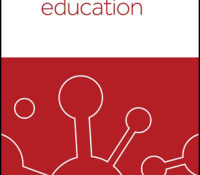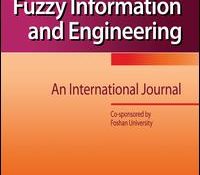
tandfonline.com har udgivet en rapport under søgningen “Teacher Education Mathematics”: ABSTRACT ABSTRACT Background and Context. Valid assessment of understanding of programming concepts in primary school children is essential to implement and improve programming education. Objective. We developed and validated the Computerized Adaptive Programming Concepts Test (CAPCT) with a novel application of Item Response Theory. The CAPCT is a web-based and resource-efficient adaptive assessment of 4489 questions measuring: the understanding of basic sequences, loops, conditions (if & if-else statements), debugging, multiple agents, procedures, and the ability to generalize to a new syntax. Method. Data was collected through an existing online adaptive practice and monitoring system called Math Garden. We collected 14 million responses from 93,341 Dutch children (ages 4 – 13). Findings. The CAPCT demonstrated good psychometric qualities because 75% of… Continue Reading →
Like this:
Like Loading...
eric.ed.gov har udgivet: This study compared the relative effects of three kindergarten schedules on children’s achievement in reading, writing, and mathematics, and on children’s prosocial classroom behaviors. Participating were 47 children attending all-day kindergarten, 56 attending alternate-day kindergarten, and 44 attending half-day kindergarten. Individual achievement tests were administered in a pretest-posttest procedure. Analysis of covariance showed that the all-day kindergarten group scored significantly higher in reading, with no significant differences in mathematics or writing. Multivariate analysis of covariance for the 14 subscales of classroom social behaviors on the Hahnemann Elementary Behavior Rating Scale showed significant differences between groups, with the half-day children exhibiting higher scores on classroom behaviors that facilitate learning and lower scores on negative behaviors. Possible reasons for these differences and implications of developmentally appropriate practices, teachers’ theoretical… Continue Reading →
Like this:
Like Loading...
eric.ed.gov har udgivet: Numerous studies document high drop-out and failure rates for students in computer programming classes. Studies show that even when some students pass programming classes, they still do not know how to program. Many factors have been considered to explain this problem including gender, age, prior programming experience, major, math background, personal attributes, and the programming language itself. Research in this area has mainly been confined to introductory programming courses. This study explores the problem at a higher level. It tracks students longitudinally as they move from the first introductory programming class, to the second introductory class, and finally, to completion of an advanced programming course. The research question answered was: What are the factors contributing to the success or lack of success in advanced programming? The success… Continue Reading →
Like this:
Like Loading...
eric.ed.gov har udgivet: The study described in this report examined whether the use of “daily report cards” (“DRCs”) in elementary school classrooms improved behavior and academic achievement among students diagnosed with combined inattentive and hyperactive/impulsive attention deficit hyperactivity disorder (ADHD) and comorbid oppositional defiant disorder (ODD)/conduct disorder. Students with an Individualized Education Program (IEP) in grades 1-6 were recruited for the study and tested for ADHD to determine eligibility. Following an intake process that determined diagnosis and eligibility, a total of 63 students, each with a unique teacher, were randomly assigned either to the intervention condition (n = 33) or to the comparison condition (n = 30). The study assessed the effectiveness of “DRCs” by comparing behavioral and academic outcomes for the intervention and comparison groups at the conclusion of… Continue Reading →
Like this:
Like Loading...
tandfonline.com har udgivet en rapport under søgningen “Teacher Education Mathematics”: ABSTRACT ABSTRACT Teachers around the world have started teaching programming at the K-9 level, some due to the formal introduction of programming in the national curriculum, others without such pressure and on their own initiative. In this study, we attempted to understand which skills – both CT-related and general – are developed among pupils in the process of working with programming in schools. To do so, we interviewed 19 Swedish teachers who had been teaching programming for a couple of years on their own initiative. The teachers were selected based on their experience in teaching programming. Our thematic analysis of these interviews shed light on what skills teachers perceive pupils develop when programming. This led us to identify three themes… Continue Reading →
Like this:
Like Loading...
tandfonline.com har udgivet en rapport under søgningen “Teacher Education Mathematics”: ABSTRACT ABSTRACT An educational computer game is presented, used for beginner students to introduce some basic concepts of code execution and code writing. In this mini-language microworld game, a code should be written with which a robot can escape from a procedurally generated labyrinth. The game uses a simple language and utilizes a virtual environment, where code execution could be tracked easily. One essential advantage of the software is that after a very short training, students can start experimenting, and they can understand many basic properties of code writing and execution. Based on several pilot teaching classes in both primary schools and universities, the game is an efficient tool to introduce the bases of computer programming, which bases might be… Continue Reading →
Like this:
Like Loading...
tandfonline.com har udgivet en rapport under søgningen “Teacher Education Mathematics”: ABSTRACT ABSTRACT Previous research shows that many students find it difficult to learn computer programming. To learn computer programming includes both gaining theoretical understanding and learning to develop programmes in practice. To this end, teachers commonly design programming exercises for the students in the computer laboratory. To be able to improve the process of designing such exercises, there is a need of a more detailed understanding of the interaction between learning of theory and learning of practice in laboratory sessions. In this paper, an approach for investigating this interaction is proposed. Theoretically, the approach is based on phenomenography and variation theory. To illustrate the approach, it is demonstrated in detail how it was applied to a small but rich case… Continue Reading →
Like this:
Like Loading...
tandfonline.com har udgivet en rapport under søgningen “Teacher Education Mathematics”: Abstract Abstract Suffering of the underachievers and misdiagnosed cases brought a group of educators at Srinakharinwirot University to start a pilot project in 1980. This project led to the discovery of many issues on identification, programming, and school evaluation among experts. Questions raised from parents and teachers were in need of the right answers. Thus, many attempts have been made under the limitation of support and understanding on the needs and problems of the gifted. Rights of the gifted in education were assured for the first time by the Educational Act in 1999. Many pieces of research, fieldworks, and handbooks have been developed to enhance teachers and parents of the gifted after 1980. Although special programs and special schools have… Continue Reading →
Like this:
Like Loading...
tandfonline.com har udgivet en rapport under søgningen “Teacher Education Mathematics”: ABSTRACT ABSTRACT We characterize the recently included programming content in Swedish mathematics textbooks for elementary school. Especially, the connection between programming content and traditional mathematical content has been considered. The analytical tools used are based on the so-called 5E’s, a theoretical framework of action, developed within the ScratchMath project, and Brennan and Resnick’s (2012) terms computational concepts and practices. The result uncovers “follow a procedure” as the dominating action, in which the concepts stepwise instruction and repeated pattern were frequent. Bridging between programming and mathematics is weak in the sense that the programming content does not enhance the possibility to explore mathematical concepts and ideas. Link til kilde
Like this:
Like Loading...
tandfonline.com har udgivet en rapport under søgningen “Teacher Education Mathematics”: ABSTRACT Formulae display:?Mathematical formulae have been encoded as MathML and are displayed in this HTML version using MathJax in order to improve their display. Uncheck the box to turn MathJax off. This feature requires Javascript. Click on a formula to zoom. ABSTRACT Fuzzy Geometric Programming has been in discussion for 32 years since 1987. According to Cao, the author, he in the paper introduces its development process, aiming to promote this new branch, attracting scholars home and abroad to join in ranks of the research, and helping to solve the three conjectures of Fuzzy Geometric Programming proposed by Cao [Three guess of fuzzy geometric programming. Vol. 147. Springer; 2012. p. 591–594. (Advances in intelligent and soft computing)]. At present, many… Continue Reading →
Like this:
Like Loading...






